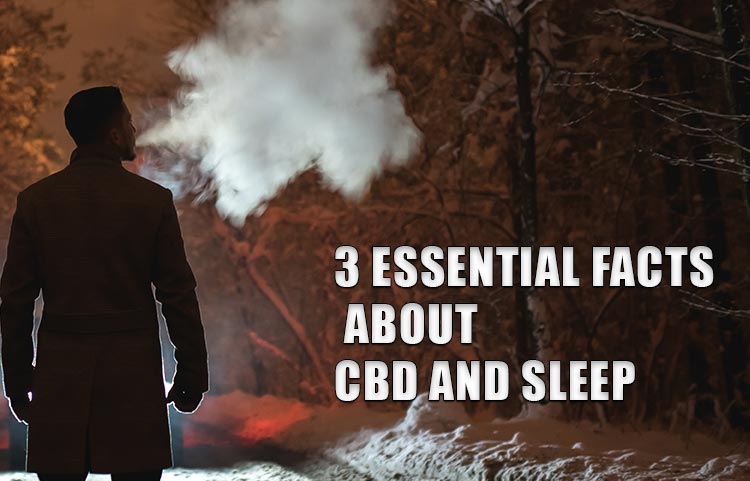Table of Contents
CBD and Sleep – Most people don’t get a full eight hours of sleep every night. And for some of us, a bad night’s sleep every now and then doesn’t have much impact on our overall wellbeing.
And even moderate sleep deprivation can cause impaired judgement and coordination. One study compared people who had been awake for 28 hours with people who were given substantial amounts of alcohol. The result? The sleep-deprivation group performed as poorly, or even worse, on tests of reaction time, coordination, and reasoning, as those who were intoxicated.
If you’re dealing with sleep issues, you know how much it can affect your life. Getting enough sleep is crucial to feeling your best. And with more and more people turning to cannabidiol, or CBD, for insomnia or other sleep issues, you may be thinking of trying it out for yourself.
There’s a wide range of CBD products available to the public. Depending on your preferred method of ingestion, you may try CBD softgels, gummies, lozenges, oral sprays, and even vape. These products are also infused with melatonin, which is a hormone responsible for controlling your sleep-wake cycle.
There’s a wide range of CBD products available to the public. Depending on your preferred method of ingestion, you may try CBD softgels, gummies, lozenges, oral sprays, and even vape. These products are also infused with melatonin, which is a hormone responsible for controlling your sleep-wake cycle.
Are you considering using CBD for sleep? Here are the top three things you need to know.
The Research is Confusing
It seems that, at least for some people, CBD does impact sleep. However, there’s no consensus about how it works.
And when you start looking into the research, the results can appear contradictory — at least on the surface. That’s because some studies have found that CBD helps people sleep, while others reported that it promotes wakefulness.
Right now, the best explanation seems to be that these effects are dose dependent. In other words, low doses of CBD seem to promote alertness, at higher doses, surprisingly, it has the opposite effect and can cause sleepiness.
Such contrasting effects on sleeping patterns may be attributed to how CBD interacts with a stress hormone called cortisol. Cortisol levels are usually high during daytime. However, for people suffering from sleep disorders, their cortisol levels peak at night. One study suggests that high doses of CBD, around 300 to 600 milligrams, can act as a sedative by regulating the release of cortisol into the body. When stress levels are low, it’s much easier to fall asleep.
While these effects may seem counterintuitive, they actually might mean that CBD is a particularly flexible tool in managing sleep problems. For example, a lower dose during the day could help stave off drowsiness, while a higher dose at night could help with drifting off to sleep.
CBD Works in Mysterious Ways
CBD is one member of a group of cannabis-derived substances known as phytocannabinoids. These substances affect the body in a variety of ways by mimicking the behavior of substances that the body produces naturally (a.k.a. endocannabinoids).
Most animals on earth have a network of receptors for endocannabinoids, which is known as the endocannabinoid system. These receptors are found in tissues throughout the body, from organs to immune system cells.
Unlike the most famous phytocannabinoid, THC, CBD is not intoxicating. In other words, while it may have an effect on mood and alertness, it doesn’t make people feel high the way THC does.
Phytocannabinoids and the endocannabinoid system work hand-in-hand to maintain different physiological and psychological functions of the body, including sleep. When an imbalance or abnormal activity occurs in the system, that’s when sleep disorders arise.
So, how does CBD affect sleep?
Well, we still have a lot to learn about the mechanisms by which CBD influences sleep. It seems to affect the brain by increasing levels of the neurotransmitters serotonin and glutamate, which affect sleep, memory, and learning.
CBD’s broad spectrum of action means that it could also affect sleep in other ways.
Remember, sleeping problems may stem from different causes. There are external factors, such as the comfort level of your environment, noise level in your surroundings, caffeine consumption, and side effects of medication. As mentioned above, CBD components have sedative effects that can counter these external factors.
On the other hand, most sleep disorders, such as insomnia, are caused by internal factors. It could be the result of a physical condition or mental health disorder. In this case, CBD can help alleviate a serious sleep disorder by targeting the root cause. For example, if CBD reduces insomnia triggers like pain or anxiety, it could have a powerful — albeit indirect — effect on wakefulness.
When it Comes to Sleep, CBD and THC may be BFFs
In 2007, a review in the journal Chemistry & Biodiversity evaluated studies on the impact of THC and CBD on sleep. It evaluated results from studies that looked at each phytocannabinoid separately and compared them to research on the drug Sativex (nabiximols), which combines THC and CBD in equal parts.
In general, the researchers found that CBD tended to promote wakefulness, while THC-based treatments had a more sedative effect.
When the two were used together in equal proportions, the patients experienced a substantial improvement in their sleep, with 40 to 50 percent of patients reporting “good” or “very good” quality of sleep after as long as four years.
The Takeaway
There is still a lot to learn about using CBD for sleep. For now, anecdotal evidence seems to suggest that it’s very effective for some people, it might not work for everyone.
If you’re thinking of using CBD for reasons unrelated to sleep, you might be wondering whether it will cause problems with your sleep patterns. After all, if you’re not looking for wakefulness or a sleep aid, that is a very reasonable concern.
In 2018, a double-blind, randomized study followed volunteers after taking either CBD or placebo. They found that, for these healthy volunteers, CBD did not affect sleep.
No matter why you’re thinking of trying CBD, you should consult your doctor before you add it to your regimen. This is especially true if you’re taking other medications.
That’s because CBD has the potential to interact with some common medications and can either increase unwanted side effects or decrease the efficacy of your medicine. Your doctor can help you adjust your dosage if necessary, to make sure that you’re getting the most effective care possible.






